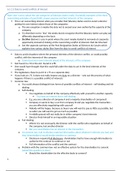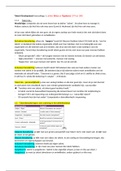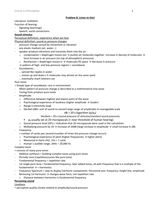Note: don’t worry about the sub-categories of fiduciary duties really. Essentially examples of the three
overarching principles of good faith, proper purpose and best interests of the company
This is an overarching interest when you consider that fiduciary duties exist to avoid a director
putting his own interest above those of the companies
o The one exception is maybe the duty not to exceed your own authority/the capacity of the
company
o Try therefore not to “box” the duties but do recognise that the fiduciary duties can play out
differently depending on the facts
o Da Silva (below) is case in point where the court maybe looked to narrowly at corporate
opportunity instead of looking at the overarching conflict of interests that Da Silva had
o See the separate summary of the Post Resignation Duties of Directors by Cassim which
explains how various duties flow from the duty to avoid conflicts of interest
Duty to avoid situations where the personal interests of the director conflict, or could possibly
conflict, with the interests of the company
o Cannot put your own interests ahead of the interests of the company
Not found in s 76 in the Act: found in s 75
One would have thought that this could fall under the duty to act in the best interests of the
company
The legislature chose to put it in s 75 as a separate duty
If you look at s 75, it does not really impose any duty on a director – sets out the process of what
happens if there is a possible conflict of interests
Common law:
o You could always distinguish two forms of possible conflicts of interest – self-dealing and fair
dealing
o Self-dealing:
You negotiate on behalf of the company effectively with yourself in another capacity
You have an interest that is self-dealing
E.g. you are a director of company A and a majority shareholder of company B
Company A wants to buy a car from company B and you negotiate the transaction –
you are effectively negotiating with yourself
Nobody will be happy, because as buyer you will want to pay as little as possible, but
as seller you will want to get as much as possible
A middle ground will not really be in either company’s best interests
Director finds himself in an impossible situation
o Fair dealing:
Where it is not necessarily the director with the conflict who negotiates on behalf of
the company, but another director
But you nevertheless has an interest in the transaction
o At common law, had to disclose material information about whatever interests you had, and
they (shareholders) would decide whether to continue
Disclosure required full disclosure: shareholders had to have enough information to
authorise the contract to continue or not
Full information of the conflict and the contract
o Problem with the common law: not an effective system for the shareholders to consent
(asked this question in class)
Should the shareholders be the effective body to consent?
1
, Director could also be a shareholder, and when a director acts as a shareholder, he is
not disqualified from voting
A shareholder can always vote on a matter
If the director is the controlling (majority) shareholder, he could consent to the
contract in which he has a conflict of interests, even if that is detrimental to the
company
Director doesn’t have fiduciary duties when voting in the capacity as
shareholder
So when you have a controlling shareholder, this mechanism is ineffective
Requiring the consent of the shareholders does not really protect the company
o There is a remedy under common law and under s 165 (derivative action) (focus is on s 75)
In theory there would be a remedy here, but it would be difficult
below
o Common law disclosure didn’t really work; effect of it was that the contract would be
voidable
o The company could only declare the contract void if the third party knew that the director
was in breach of his fiduciary duty
We use the directing minds doctrine here (determining company knowledge)
Difficulty with this:
E.g. director X sitting on company A and company B’s board
Problem is: when will you say that the third party (B) knew that X was in
breach of his fiduciary duty to A?
The only way would probably be if X is a directing mind of company B, or the
authorised agent of company B – question of fact
Shareholding in itself does not determine that a person was a directing mind.
Only if X were a CEO of company B or some other position. Steven’s thinks we
should interpret directing minds more broadly here. Not always easy to
determine whether the third-party company knew of the conflict or not.
o Common law doesn’t help us much
S 75 –
2 main problems: ratification by shareholders and doesn’t address relationships beyond family
relationships, so SOE’s are still vulnerable.
o Sets out contracts which are entered into by directors where the director has a personal
financial interest
Does just deal with directors; applies to prescribed officers as well
Problem: strictly speaking it is the board who decides on contracts entered into by
the company (executive or not). However, in practice this is done by executive
directors because the board only meets at a maximum of 4 times per (year). The
executives, who are in charge of the day-to-day management, conclude contracts in
performance of this function. Decisions to contract made on a daily basis.
What we are saying is that the term ‘director’ in this section should have an
extended meaning all those involved in the management structure of the
company.
Want to extend it to an as wide group of people who are involved in the
management of the company as possible
They have much to gain by enriching themselves and are easily able to do so
2
, o This section also deals with the situation where a related entity/person has an interest in
the contract (someone that can benefit from the contract conclusion and might influence
the director). Could be a juristic person, or a natural person related to a juristic person
Could be a direct or indirect benefit doesn’t make sense to just target directors,
when their spouses gain the advantage for them
A natural person can be ‘related’ to a juristic person. E.g. if you choose to benefit
your spouse’s company and not personally
Can’t really regulate relationships further than this. E.g. if the two directors of the
two companies are just friends
75(1) extends the definition of what is a related party (will cover this later). Much
broader than the s 2 definition -
E.g. you are a director (X) of company A, and the director of company B.
When is a natural person related to a JP in terms of section 2? Linked to
shareholding, not directorship.
S 75 goes much broader: doesn’t mean shareholding. X doesn’t even need to
hold shares in company B; as long as he is director of both.
o When does this section not apply?
1. S 75(2)(a): s 75 does not apply to a director in respect of a decision that may
generally affect all the directors of the company in their capacity as directors
i.e. if all directors are affected by a decision, the section will not apply
E.g. s 66(8) paid remuneration for services – except to the extent that the
MOI provides otherwise, the company may pay remuneration to their
directors for their services subject to ss 9.
Subsection 9: remuneration may be paid if there is a special resolution by
shareholders which cannot be older than 2 years.
o So, can pay remuneration if the shareholders have approved it by
special resolution not older than 2 years.
o Clearly s 66(8) must apply to non-executives.
o But to what extent do shareholders have to approve salaries for
executive directors? Is 66(8) broad enough to allow shareholders to
approve executive directors’ salaries as well?
If you are dealing with a director in capacity as employee, the
board would determine salary (management issue). This
includes employment benefits
Therefore, argued that he does not receive remuneration for
service as director, but because of employment benefits from
being an employee.
o So, this section is limited to where directors are remunerated in their
capacity as directors and not an employment capacity.
Why is this necessary? S 75(2)(a) makes specific reference
to ‘capacity as director’
E.g. where the shareholders give the power to
directors to determine their remuneration.
Everyone gets inflation adjustments everyone
affected so s 75 would apply
However, salary adjustments as employees would probably
not be dealt with under this section
2. S 75(2)(a) continued: s 75 does not apply to a director in respect of a decision that
may generally affect a class of persons, despite the fact that the director is one
3
, member of that class of persons, unless the only members of the class are the
director or persons related or inter-related to the director
point of s 75 if a director has a personal financial interest in a decision, the
director must withdraw himself from the decision making process. This
section says that if all the directors are affected, OR if a class of people are
affected by the decision and one of the directors is a member of that class, he
need not exclude himself.
E.g. you have class A, B and C shares in a company
The directors decide to change the rights of one class (which would be a
beneficial change for them, because the directors hold some of these shares,
but they are not the only shareholders in that class – there are also other
shareholders in that class)
o The directors are members of the class; they do have a financial
interest, but the change benefits everybody, not just the directors
Persons in a class must have equality
o S 75 doesn’t kick in
o If they however are the only people in that class, they cannot vote on
that matter
Would otherwise be able to determine his own rights
3. S 75(2)(ii): this section does not apply in respect of a proposal to remove that
director from office as contemplate in s 71.
Strange provision
What it means in effect is that the director may participate in such a decision
When we consider removal of directors in s 71, there is a narrow set of
circumstances where the board is able to dismiss a director (e.g.
incapacitated, disqualification, dereliction)
But s 71(3) the board, other than the director concerned, must determine
the matter by resolution and may remove a director whom it has determine
to be ineligible, incapacitated…
These two provisions seem contradictory. S 75 says he can be party to this
decision, and s 71 says that he cannot.
o But surely that person should not be involved in his own disciplinary
hearing?
4. S 75(2)(b) - If you are the only director and the only shareholder of a company, this
section cannot apply
If, however, in terms of s 75(3), you are the only director, but you are not the
only shareholder (i.e. not the only beneficially interest holder), then the
shareholders have to consent where you have a conflict of interests
Must disclose
Think: what if a trust is the sole beneficial interest holder? Even if you are the
only beneficiary, the trust would have to consent. i.t.o the Company’s Act, a
trust is a juristic person. So, it would be good governance to get the trustees
consent.
o S 75(4) -
At the beginning of each financial year, each director would normally disclose all the
interests they have
This would be a general disclosure
But there is no obligation to do so.
Before each conflict of interest arises, another specific disclosure has to be made
again with regard to the nature of the conflict
4











